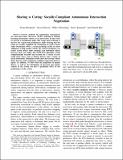Sharing is Caring: Socially-Compliant Autonomous Intersection Negotiation
Author(s)
Buckman, Noam; Pierson, Alyssa; Schwarting, Wilko; Karaman, Sertac; Rus, Daniela L
DownloadIROS2019_SVO_Coordination.pdf (1.273Mb)
Open Access Policy
Open Access Policy
Creative Commons Attribution-Noncommercial-Share Alike
Terms of use
Metadata
Show full item recordAbstract
Current methods for autonomous management use strict first-come, first-serve (FCFS) ordering to manage incoming autonomous vehicles at an intersection. In this work, we present a coordination policy that swaps agent ordering to increase the system-wide performance while ensuring that the swaps are socially compliant. By considering an agent's Social Value Orientation (SVO), a social psychology metric for their willingness to help another vehicle, the central coordinator can reduce system delays while ensuring each individual vehicle increases their own utility. The FCFS-SVO algorithm is both computationally tractable and accounts for a variety of real-world agent types, such as human drivers and a variety of social orientations. Simulation results show that average vehicle delays decrease with swapping by enabling cooperation between agents. In addition, we show that the proportion of human drivers, as well as, the distribution of prosocial and egoistic vehicles in the system can have a prominent effect on the performance of the system.
Date issued
2020-01Department
Massachusetts Institute of Technology. Computer Science and Artificial Intelligence Laboratory; Massachusetts Institute of Technology. Department of Aeronautics and AstronauticsJournal
IEEE/RSJ International Conference on Intelligent Robots and Systems (IROS)
Publisher
Institute of Electrical and Electronics Engineers (IEEE)
Citation
Buckman, Noam et al. "Sharing is Caring: Socially-Compliant Autonomous Intersection Negotiation." IEEE/RSJ International Conference on Intelligent Robots and Systems (IROS), November 2019, Macau, China, Institute of Electrical and Electronics Engineers, January 2020 © 2019 IEEE
Version: Author's final manuscript
ISBN
9781728140049
ISSN
2153-0866